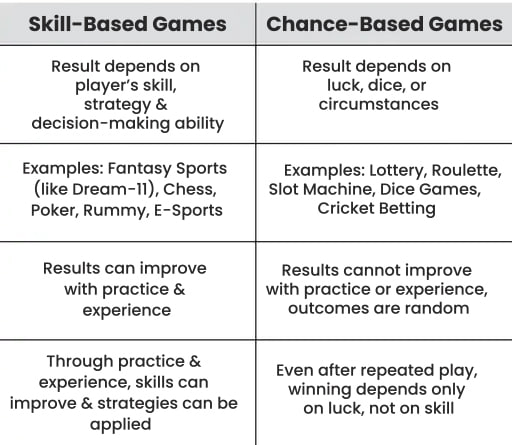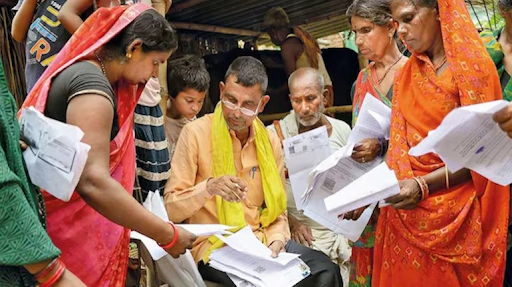



The Promotion and Regulation of Online Gaming Bill, 2025, proposes a ban on online money games, including skill-based ones like fantasy sports, to combat addiction, financial losses, and illicit activities. However, it also raises concerns about job losses and the rise of the illegal betting market, highlighting constitutional ambiguities.

Copyright infringement not intended
Picture Courtesy: HINDUSTAN TIMES
The Lok Sabha passed The Promotion and Regulation of Online Gaming Bill 2025 to prohibit the offering, operation, facilitation, advertisement, promotion and participation in online money games.
Online gaming refers to games played over the internet, including free-to-play games, e-sports, and skill-based games.
Real-money gaming (RMG) involves players betting real cash for cash or cash-equivalent rewards. Examples include fantasy sports (Dream11), rummy, poker, and sports-betting apps.
 How does the Indian legal framework treat online gaming?
How does the Indian legal framework treat online gaming?
Betting/gambling is a State subject: Under the Constitution (Entry 34, State List) each state can make laws on gambling and betting. Many states ban games of chance but exempt games of skill.
Centre’s role: Centre uses its authority over interstate commerce and information technology to regulate games played across states or internationally.
Thus, India’s online Gaming framework is split: states legislate gaming within borders, while the Centre uses GST/IT/financial laws on cross-border aspects.
Judicial Intervention: Courts have protected skill games under Article 19(1)(g) (trade) and struck down blanket bans that include them. Key rulings:
Industry size & growth: Online gaming industry generated about $3.8 B in FY24 and is projected to reach over $9 B by 2029.
Jobs: Gaming supports over 2 lakh direct and indirect jobs (engineering, animation, content).
Player losses: Government estimates over 45 crore Indians play RMG and collectively lose nearly ₹20,000 crore annually. These losses fall on individuals and families.
Health & social costs: Gaming leads to addiction, mental health issues, and financial stress, especially among young users. Minors access these games despite age restrictions.
IT Act and Rules: Online gaming platforms are treated as “intermediaries” under the IT Act 2000.
Self-Regulation: Government has encouraged Self-Regulatory Organizations (SROs) in gaming.
Taxation (GST): Since October 2023, online gaming firms must pay 28% GST on the “entire stake” (face value of bets). From FY24-25 onward, there is also a 30% tax on net winnings.
Blocking & Enforcement: Under IT rules (Section 69A), the government can order Internet Service Providers (ISPs) to block access to sites or apps involved in unlicensed gaming or gambling.
Advertising codes: The Advertising Standards Council of India (ASCI) and the Consumer Protection Authority have guidelines for gaming ads. Advertisements must be legal, decent, honest and truthful.
Blanket Ban on RMG: The draft Promotion and Regulation of Online Gaming Bill, 2025 prohibits “online money gaming” – offering, operating, facilitating, or advertising any real-money game.
Promotion and recognition of esports: Formally recognizes esports as a legitimate competitive sport in India.
Promotion of social and educational games: Empowers the government to "recognise, categorise, and register" online social games.
Central Gaming Authority: Establish a national regulator (an Authority or Agency) with powers to classify games and oversee the sector.
Offences & penalties: Imprisonment for up to three years and/or a fine of up to ₹1 crore for entities involved in or facilitating online money gaming.
Skill vs Chance: Critics say banning all RMG ignores the legal distinction between skill games and gambling.
Economic fallout: The ban threatens a large legitimate industry.
Federalism & Ambiguity: Some experts say the law overlaps with state powers (gaming is in the State List).
Enforcement issues: Many illegal platforms are offshore; authorities say most of are using cryptocurrency (which evades Indian KYC). Unless crypto rails are strictly regulated, users may herd to unregistered operators abroad.
Policy Instability: Shift from a “tax-and-regulate” approach (GST on gaming, anti-fraud rules) to a pure ban.
Harmonize laws: Adopt a cooperative federal approach; a model national framework that clearly defines “skill” and “chance”, leaving room for states to adapt but avoiding conflicts.
Strengthen SROs and tech tools: Empower self-regulatory bodies for gaming; making them mandatory (as per IT rules) could improve management.
Consumer safeguards: Instead of a total ban, focus on harm reduction, banning credit or loans for gaming, and funding addiction counselling programs.
AML/KYC enforcement: Bring online gaming under the Prevention of Money Laundering Act and strict KYC norms, any real-money game must collect verified ID, report suspicious transactions, and freeze suspicious accounts.
Economic measures: Legalizing some forms of skill gaming under license (like a lottery or regulated betting market) could increase taxes and reduce underground play.
Balanced regulation, not blanket ban: Strict rules for high-risk games, but allow regulated skill contests under license. For example, fantasy sports could be licensed with consumer protections (like RBI does for casinos abroad).
What India can Learn from Other Countries
UK enforces licensing, audits, and penalties. Its GAMSTOP scheme enables players to self-exclude from all UK-regulated platforms with a single request. India can adopt a similar central regulator with mandatory self-exclusion tools to address addiction concerns effectively.
Singapore's Gambling Regulatory Authority (GRA) utilizes a central model to enforce age limits, spending caps, and self-exclusion. India can adopt similar social safeguards across states.
Australia's federal law bans harmful online gambling, however states regulate lotteries and sports betting. India could employ a similar layered approach, with a national law restricting specific games and states managing local licenses.
Online gaming in India sits at a crossroads. The sector promises innovation, jobs and entertainment, but also poses risks of addiction and fraud. The new law takes a hardline approach—prioritizing safety and financial security by banning.
Source: THE HINDU
|
PRACTICE QUESTION Q. “While regulation is essential, a blanket ban on online real-money games can prove counter-productive." Critically analyze. 250 words |
It is defined as a game where a user pays money to play with the expectation of a monetary return, regardless of whether it is based on skill or chance.
The primary central legislation is the Public Gambling Act of 1867. However, "betting and gambling" is a subject on the State List, meaning individual states have the authority to legislate and regulate it within their own borders.
A game of skill is one where the outcome is determined mainly by the player's expertise, knowledge, strategy, and experience. In contrast, a game of chance is predominantly determined by luck or a random event, with the player having minimal control over the result.



© 2026 iasgyan. All right reserved